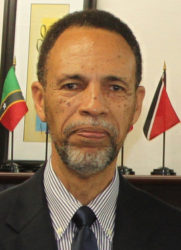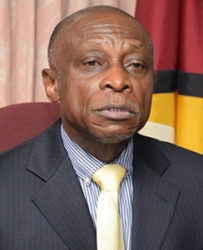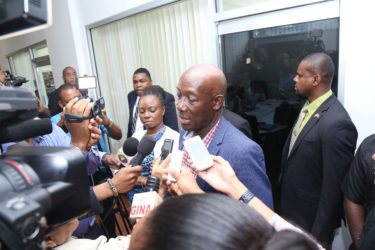A PRESENTATION BY AMBASSADOR COLIN GRANDERSON ASSISTANT SECRETARY-GENERAL FOREIGN AND COMMUNITY RELATIONS CARIBBEAN COMMUNITY (CARICOM) SECRETARIAT AT THE ORIENTATION PROGRAMME FOR THE NEWLY APPOINTED HEADS OF GUYANA MISSIONS
Caricom, going forward
In 2012, one year before the celebration of the Fortieth Anniversary of the Caribbean Community, the Conference took the decision to “re-examine the future direction of the Community and the arrangements for carrying it forward”. This commitment had come soon after the public relations fiasco in 2011 of the so-called “pause” which was incorrectly portrayed by the media and other commentators as having put a stop to the implementation of both the Single Market and the Single Economy. On the contrary, it called for a pause on the Single Economy for capacity reasons while consolidating the Single Market. The history of the CARICOM integration process indicates that the Community has always had an eye on the future and has never been static. The transition from free trade through CARIFTA, to a Common Market, to a Single Market and, eventually, onto a Single Economy, gives evidence of that fact. There are however periods when the forward movement is so slow that it is wrongly perceived as stagnation.
Sustainable development
The Caribbean Community Strategic Plan is premised on building resilience in all spheres in order to achieve Sustainable Development. These encompass in the main, the economic, social, and environmental spheres, but the plan also recognises the importance of addressing technological resilience, without which our ability to address true development in other spheres would be greatly stymied. As the Preface of the Plan indicates, it outlines the strategic repositioning of the Community and captures a Development Agenda going forward that encompasses:
(i) A review of development needs;
(ii) A Resilience Model for socio-economic progress premised on economic, social, environmental and technological resilience;
(iii) Strategies to renew the commitment and to strengthen the actions for regional unity; and
(iv) An agenda for the reform of governance mechanisms.
The implementation of this Plan by the Community and the CARICOM Secretariat will certainly be among the major future objectives of the Community. The Secretariat has embarked on a change and reform process which is currently underway to ensure that it is well prepared for the future. A Community Operation Plan 2016-2017 has been drafted. It will ensure a coherent approach by the three implementing partners – the Member States, Community institutions and the Secretariat – towards achieving the goals under the eleven priority areas identified by Heads of Government under the Strategic Plan. A Business Plan for the Secretariat is in its final stages and a reform of the Secretariat will follow. At the same time, attention is being focused on the integration and governance architecture to enable the Community to better respond to the demands of now and the future. To this end, efforts are underway to amend the Revised Treaty of Chaguaramas in order to address its limitations as well as to take into account the profound changes taking place in the wider region and further afield.

Decision formulation and decision-making
Following the watershed decision of the Caribbean Court of Justice (CCJ) on the Shanique Myrie vs Barbados immigration case which underlined that decisions of the Conference of Heads of Government represent Community law, increasing focus is being placed, and in the future will have to be placed, on procedural matters such as decision-making and decision-formulation as well as implementation of decisions. In order to facilitate implementation, a new mechanism has been established, the Committee of CARICOM Ambassadors. They are the designated representatives of Heads of Government with respect to Community affairs. They will be the link between the Secretariat and their Member States and will report to the Community Council. The mechanism is proof of the institutional reform progress being made.
Widening and deepening the community
An issue which has remained dormant for some time but which is starting to rear its head is the widening and deepening of the Community. Because of its potentially profound impact on the future of the integration process, and the questions it raises, the issue will no doubt engage the attention of Heads of Government in the coming years. Among these questions would be what would deepening entail and the impact of widening on the operations of the Community, on achieving a single economy, on foreign policy co-ordination and on the very personality of the Community though it would broaden the regional market. The matter has been given new life by several developments – the renewed request of the Dominican Republic (DR) to become a Member of CARICOM, an issue which has been placed in abeyance for the time being following the unacceptable treatment meted out to Dominicans of Haitian descent made stateless following the Constitutional Court ruling of 2013 on nationality; the request for Associate Membership from the French and Dutch overseas territories in our region; and the profound changes taking place in Cuba associated with the establishment of diplomatic relations between the United States (US) and Cuba and which make Cuba a new open market as well as a competitor for the Community. The Secretariat was mandated by the Conference in February of this year to make policy recommendations on the enlargement of the Community.
Even as the Community embarks on the upgrading and updating of its institutional procedures and systems to respond more effectively to the need to improve the welfare of the people of the Community; even as it considers the issues of future widening and deepening as part of the future pathway of the Community, the maintenance of the integrity of the integration process will be a source of heightened concern. History, insularity, the unyielding persistence of the current economic and social difficulties have turned the individual gaze inwards. The burden placed on the capacities of the smaller States of the Community to service the competing demands of two integration processes are also an obstacle. A sense of inequity, expressed or unsaid, in the distribution of the benefits of the integration process, and the widespread negative perception of public opinion with regard to the workings and even the usefulness of CARICOM conflate with the preceding to pose a testing challenge for the future of the Community. The recent decision of the British to exit the European Union (EU), the model to quite an extent of our own integration process, is a disquieting precedent. Dialogue remains a valuable tool for deepening a sense of community and resolving problems which disturb harmony as we have seen recently with the talks between Jamaica and Trinidad and Tobago.

On the external affairs front, the profound geo-political and geo-economic transformations taking place as well as the shifts in the balance of power in our wider region and beyond will continue to pose challenges to the Community and require both short-term and a long-term response. Cognizant for quite some time of the decreasing interest of its traditional partners, the Community has sought, with some success, to diversify its relationships. Diplomatic and political relations, and to a lesser extent economic relations, have improved with Central and Latin America. Regionally and bilaterally, relations have been established with a number of extra-regional Third States, many as development partners on the basis of technical cooperation. Maintaining and strengthening traditional and historical ties will remain vital. However, the loss of the United Kingdom (UK) as an ally in the councils of the EU reveals the strategic shortcomings of not following through on opportunities and decisions to seek to build bridges to the former Eastern European States of the EU which have absolutely no knowledge of the peculiarities of the Small States of the Caribbean Community. The role that they play in shaping the funding and development policies of the EU towards the African, Caribbean and Pacific (ACP) countries makes them a priority objective as part of the continuing effort of the Community to diversify its relations. Making existing relations with Western European members of the EU more meaningful has become even more necessary in the present circumstances. We must also bear in mind the importance of Africa and pay more political attention to the ACP.
Policy-setting and rule-making
Another continuing priority which the Community will have to address relates to the increasing policy-setting and rule-making dimension of the workings of the international system. Of prime interest on the positive side are the implications for the future course of the Community’s development stemming from the recent policy-setting global conferences on Small Island Developing States (SIDS), Financing for Development, the Post 2030 Agenda, and the Paris Agreement on Climate Change. The Community will need to be proactive and to strengthen its capacity to extract benefits as well as resources from these watershed agreements. There are however other policy-setting and rule-making international instances in which the Community has no direct voice and which have been detrimental to the economic and financial interests of the Community. These include the policies of “graduation” and “differentiation” increasingly applied by the developed countries with regard to the provision of the Overseas Development Agency (ODA) resources and the regulation of access to concessional financial resources. Other harmful rules and regulations have given rise to the “blacklisting” of our financial services sectors as tax havens and, more recently, the phenomenon of “de-risking” flowing from efforts to combat the illicit flow of terrorism financing which has led to a sharp curtailment of the region’s banking sector correspondent banking relations with overseas banks. This in turn has increasingly impinged on the trade and tourism sectors of the Community and remittances, and consequently, on the very survival of our economies. A considerable amount of precious resources and time have already been expended in responding through advocacy to these assaults which will no doubt continue into the future as the international fight against terrorism becomes more consuming and throws up more regulatory hurdles.
Maritime affairs
Despite being comprised of Islands and Coastal States, CARICOM in the past has paid only scant attention to the strategic and economic value of its maritime territory. This awareness is starting to come alive. Member States have started to recognize the value of the marine spaces within the Exclusive Economic Zone (EEZ) and have committed to resourcing action plans to optimize their productivity. CARICOM has played a leading role in the efforts of the Association of Caribbean States (ACS) to have the Caribbean Sea recognized by the United Nations (UN) as a zone of sustainable development. Jamaica has been calling on Member States to participate more actively in the meetings of the International Seabed Authority in Kingston. In May 2015, the Foreign Ministers Council (COFCOR) debated during its “Retreat” the strategic dimensions of the Caribbean Sea with one quipping that instead of seeing ourselves as SIDS we should project ourselves as Large Oceanic Territories (LOTS). The May-July 2015 promulgation of the Presidential Decrees of the Bolivarian Republic of Venezuela that made spurious claims to the maritime territory and EEZ of Guyana and of a large number of CARICOM Member States was a wake-up call. The study done by the Community’s Law of the Sea experts in analyzing the impact of the Decrees highlighted the lack of maritime delimitation in many parts of the region. The preceding developments and the upcoming UN preparatory negotiations on bio-diversity in maritime territory Beyond National Jurisdiction (BBNJ) where CARICOM will be active as well as the promises that the “blue” economy and not only the “green” economy could hold in the future will give greater prominence to this issue on the CARICOM Agenda in the coming years.

Co-ordinating foreign policy
Foreign Policy Coordination will remain a valuable mechanism if the Community is to attain its external affairs objectives as well as to have its voice heard in the global cacophony. It also serves to optimally position the Community in the hemispheric and global environments to address key challenges and to take advantage of opportunities. However, steps need to be taken to strengthen and render more effective the coordination of foreign policy. This will involve greater use of Information Communication Technology (ICT), and overcoming the constraints of divergent economic and foreign policy interests of individual sovereign Member States. A neglected but vital dimension of foreign policy coordination is the need to improve in-country consultation and coordination, information exchange and national coordination as a prelude to Community coordination. The CARICOM Caucuses in major Capitals play a key role in ensuring that the Community speaks with one voice. However, the mechanism needs to be strengthened in some Capitals. It is clear that the effectiveness depends to quite an extent on the chemistry between individual CARICOM Heads of Mission. Another mechanism which Foreign Ministers have been considering would be the various forms of “Joint Representation”. Though this approach worked in the early days of independence, there is apparently more reluctance today. It does however provide a cost-sharing possibility for increasing CARICOM representation in Capitals identified as being of strategic importance to the Community but beyond the capacity of individual Member States.
CSME
The CARICOM Single Market and Economy (CSME) has been since 1989 a crucial element of the past and present of the integration process and will no doubt remain so in the future. Despite the fact that the international environment has become less accommodating and economic development has stagnated, CARICOM Member States continue to view the CSME as the best vehicle to promote economic integration and as one of the strategies for sustainable growth and development. In an effort to address the trends of persistent low growth, low levels of unemployment, especially among youth, it was recognized that there was need for a programme for catalysing growth. Heads of Governments in 2013 established the CARICOM Commission on the Economy to address fiscal sustainability, debt relief and restructuring, resource mobilization and unemployment as well as cross–cutting energy and ICT. A Regional Transportation Commission has also been established to address the critical needs of this sector which is vital to the movement of people, goods and services in the Region. As further testimony to the renewed focus being placed on the operations of the flagship programme of CARICOM, Heads of Government have called for a “comprehensive review of the status of the CSME for consideration at their Inter-sessional meeting next year”. It would not be surprising if other Member States were to establish Commissions as Jamaica has done. Breathing new life into the Single Market and coming to terms with the complexities of the Single Economy will not doubt remain a major but reinvigorated priority.
An emerging area of economic activity whose potential is being increasingly explored and encouraged is the Creative Economy. It is driven by, and in turn, fuels the Knowledge Economy, where creativity is a powerful engine of economic growth and wealth creation. It is characterized by new innovative technologies spawned by ICT, new occupations based on knowledge intensive activities, and economic value derived from human creativity and intellectual property value in intangibles such as ideas, design, brands and style. Creative content is also driving the development and sale of new technologies and related software. The creative industries are at the core of the Knowledge and Creative Economies.
Shoring up trading arrangements
Against the background of CARICOM’s anaemic export trade performance over the last few years, the Community’s Strategic Plan identifies a number of activities designed to improve the region’s competitiveness and to address supply side constraints. At the same time, CARICOM is working on ways in which its exporters can make better use of existing trade agreements with third countries, such as Cuba, the DR and the EU. In recognition of the need to strengthen economic relations within the wider region and hemisphere, CARICOM is also examining the implications of concluding trade arrangements with countries in Central America and selected countries in South America, including Brazil and Chile. These analyses will assist CARICOM in deciding its future external trade negotiating agenda over the coming years.
Crime and security
In the area of security a CARICOM Crime and Security Strategy (CCSS) is being implemented. Increased focus has been placed on this issue by Heads of Government and they have called for it to figure prominently in the agenda of their meetings in the future. The incidence of gun and gang violence has escalated sharply with adverse effects on citizen security as well as on economic development. A regional agency, CARICOM Implementation Agency for Crime and Security (IMPACS), with its own specialised branches – the Fusion Centre and the Joint Regional Communication Centre (JRCC) – plays a regional coordinating role. Several regional legal instruments have been developed in support of the Crime and Security Agenda and need to be ratified by all Member States. The media spotlight focused recently on the CARICOM Arrest Warrant Treaty (CAWT). Emerging issues of concern for the Region include the proliferation of Small Arms and Light Weapons (SALW), addressing the nexus between TOC, terrorism and gangs, the increase in Nationalities of Interest (NOI) traversing the region, and the future security threat that could result from the return of CARICOM nationals active abroad in groups advocating violent extremism such as ISIS. In view of the transnational nature of many security threats, assistance and technical cooperation with external partners has become of vital importance.




